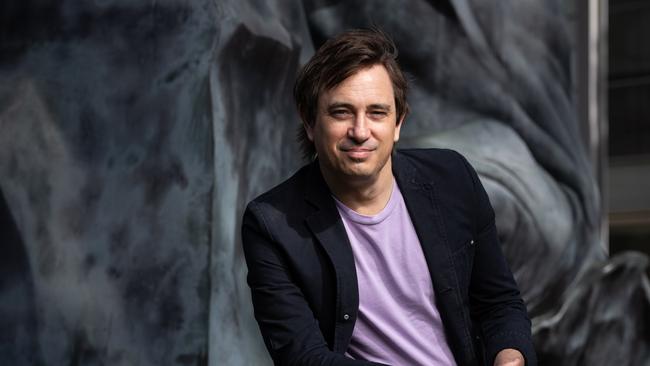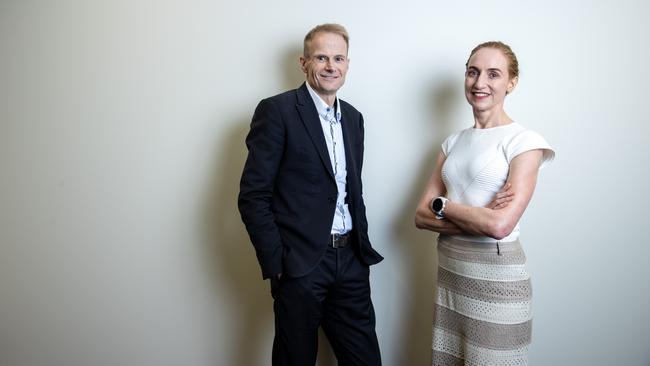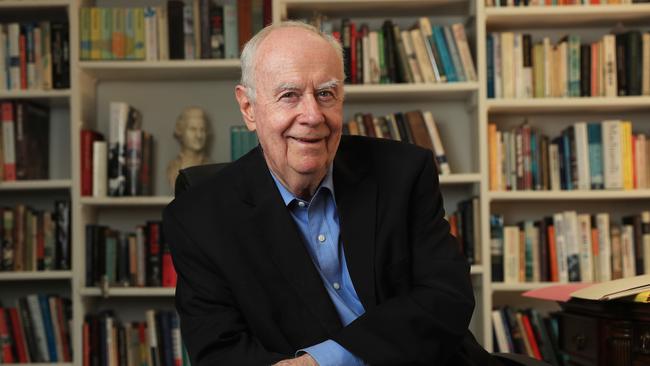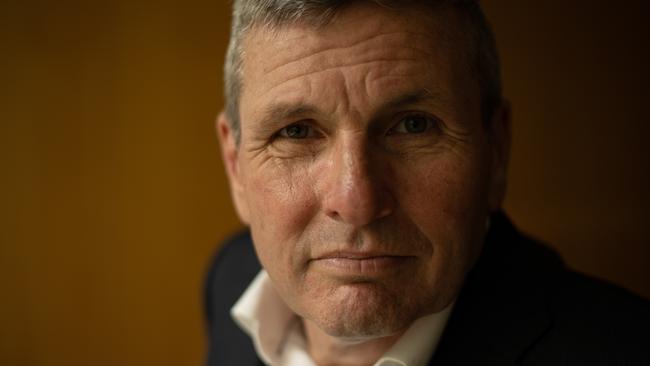Ideas are the source of all power in human affairs
Political power may grow out of the barrel of a gun but it is an idea that compels someone to pull the trigger, to raise an army, to start a war.
Twenty-four hours into what was dubbed Operation Desert Storm, newsrooms around the country were humming, as nothing animates journalists like a catastrophe.
The Australian published a “special Gulf Edition” with 11 pages of coverage and reports from Washington, Amman and London.
It was all hands on deck at The Canberra Times, where I was working, when the editor decreed we would produce a rare mid-morning edition of the paper to keep the national capital’s citizens abreast of developments. Adding to the hubbub was the commentary from the office’s only television, tuned to a satellite feed from Iraq courtesy of little-known American broadcaster, the Cable News Network.
A CNN crew had stayed in Baghdad when the major networks pulled out at the urging of the US government. The reward for the world’s first 24-hour news network was that it alone broadcast the opening shots of the war: eerie green images from a single camera on the balcony of a hotel room as the night sky over the city blazed with explosions and anti-aircraft fire.
As we gathered for a photo around the historic front page, the revelry was hushed by an image that flashed on TV. CNN made a dramatic cut to Israel where a journalist appeared in what looked like a World War I-issue gas mask. He said Iraqi Scud missiles were falling on Tel Aviv and there were fears they carried chemical weapons.

Speculation about chemical payloads turned out to be unfounded. Israel was not provoked into joining the war. But none of us knew that then. All we knew was that our treasured front page was out of date before the print run had finished.
My vivid recollection of what it meant for journalism was: “This changes everything.”
But 24-hour news was just a rifle shot before the Big Bang. Just a month before the American-led attack on Iraq, the World Wide Web had been born. It grew in a geometric progression, forcing its way into every corner of our lives, giving birth to email, Google, Facebook, Twitter and a bewildering array of other platforms.
Unlike Iraq, Operation Data Storm did develop a weapon of mass destruction. It was born in 2007 when one device merged the information superhighway into a single lane. At its launch the co-founder of Apple, Steve Jobs, declared the iPhone put “the internet in your pocket for the first time ever”. No one could have conceived then what that would mean.
This smartphone turned the bulk of humanity into broadcasters and set the world on a radically new path. We are just a few steps along this mapless journey, destination unknown. This much is certain: we are living through the greatest power shift in human history. Because the wellhead of power does not flow down from monarchies, tyrannies or democracies but up from the ebb and flow of ideas that transform crowds into mobs.
Ideas are the source of all power in human affairs. As rational animals, ideas are the ground of our being because we only make sense of ourselves and the world by standing on the mental flagstones of our culture. That is both a blessing and a curse because cultures can be wildly divergent. Two people witnessing the same event can take polar opposite views on it based entirely on their worldview. In a politically diverse, multicultural democracy those differences exist in the same postcode.
No one better encapsulated the power of the human psyche to shape its own reality than John Milton in Paradise Lost, when his fallen Satan decides it is better to rule in Hell than serve in Heaven: “The mind is its own place, and in itself can make a heaven of hell, a hell of heaven.”
Political power may grow out of the barrel of a gun but it is an idea that compels someone to pull the trigger, to raise an army, to start a war.
Every monarch, president and tyrant’s deepest fear is that the ideological ground will shift under their feet and the people will turn on them. That moment comes when enough of the mob decide the existing order can no longer be trusted. And, as Vladimir Lenin knew, you don’t need all the people to instigate a revolution, just enough for a vanguard.
Gustave le Bon wrote of the power of ideas in 1895 in his book The Crowd: A Study of the Popular Mind: “The memorable events of history are the visible effects of the invisible changes in human thought. The reason these events are so rare is that there is nothing so stable in a race as the inherited groundwork of its thoughts.”

But when the French polymath surveyed the world at the end of the 19th century and decreed “the divine right of kings is becoming the divine right of the masses”,
le Bon could never have imagined revolutionary ideas flowing at the speed of light to masses in every corner of the globe.
History shows the invisible changes in human thought can be a force for good or evil, for creation or destruction.
In The Revolt of the Public, Martin Gurri describes this era as heralding a tectonic shift in the balance of political power, “between authority and obedience, ruler and ruled, elite and public, so that each can inflict damage on the other but neither can obtain a decisive advantage”.
Optimists see this age as a great democratisation, pessimists fear it has unleashed the murderous instincts of the mob. More likely it will be bits of both these things, mostly because of our nature. It’s the inconvenient truth Aleksandr Solzhenitsyn uttered in The Gulag Archipelago: “The line dividing good and evil cuts through the heart of every human being.”
The best wishes and worst desires of almost every human heart have now been grafted to an irresistible internet appendage, just a hare-brained thought away from international broadcast.
This nuclear fission of the information ecosystem has unleashed the Chaos of Greek mythology, which the Roman poet Ovid described as “a rude and undigested mass, and nothing more than an inert weight, and the discordant atoms of things not harmonising, heaped together in the same spot”.
Sound familiar? The portal to all this is in your pocket. Step Through the Looking Glass and all manner of wonder and horror abound. And it comes with the illusion that you are in control. “It’s a great huge game of chess that’s being played – all over the world – if this is the world at all, you know,” said Alice.
Data Chaos builds as it breaks. It does not discriminate between truth and lies. It spews out good, bad and wretched ideas in equal measure. The pocket-dialled internet can rally individuals across continents to create communities of goodwill. It can also drip lies into the lonely minds of isolated soldiers of fortune and build armies of rage. Chaos is for and against everything. It has ushered in the Great Destabilisation, the true end of certainty.
An early casualty of Chaos was commercial media, which was confronted not only by the competition of billions but also the haemorrhage of cash as advertisers followed the masses to new platforms. This was just the first of the old institutions to be badly wounded and all are now under siege as Chaos eats the old order.
Different societies are ordered in different ways. In tyrannies the organising principles are propaganda and fear – they endure as long as people are brainwashed and afraid. In functioning liberal democracies, order should be built on persuasion and trust and they endure only as long as most people have faith in them.
Fiat currency is an example of the power of this trust. Money is intrinsically worthless. The only value in it is we believe there is a value. We know what happens when people lose faith in a currency: devaluation, hyperinflation, capital flight, economic collapse and violence.
The death of an idea often leads to death in the real world. If ideas are not powerful then why do dictators fear them so much? Why would Vladimir Putin murder Alexei Navalny? Because even a zek locked in a freezing cell in the Arctic Circle plays on the mind of a tyrant, if he fears the contagion of his opponent’s ideas will spread.
If ideas were not dangerous, Xi Jinping wouldn’t be spending more on internal security than on defence, turning his nation into a cradle-to-grave, breakfast-to-bedtime surveillance state. He now seeks to create a mental gulag and cast himself as a secular god, worshipped in a gated cathedral of the mind.
As Martin Gurri observes, propaganda is the totalitarian’s admission that his power isn’t total. By their actions, modern tyrants show they understand the threat the Data Chaos poses to their order. They see the dangers of the dissident networked era and are determined to leash the data storm.
It is not evident that the leaders of democracies have recognised these signs of the times and, even if they did, it’s not obvious what defences a democracy can build. Of all forms of government, liberal democracy faces the greatest threat from Data Chaos.
Democracy’s innovation was to allow most people the release of having a limited say in how they are ruled. But post elections they then vest the divine right to rule in a new aristocracy of politicians, governments, public services, universities and business.
Once only politicians had to fear the vicissitudes of the mob. The rest of the neo-aristocracy reigned on as governments came and went. Chaos now besieges all institutional castles, as trust in all is relentlessly contested by alternative facts and fictions of the data storm. And the threats lie on all sides.
On the revolutionary Right, suspicion of the neo-aristocracy is terminal. Its soldiers believe the commanding heights of bureaucracies, universities, the law and the media have been taken by an ascendant Left. As evidence they point to the “progressive” posturing of almost all institutions, a worldview the Right sees as toxic.
Coupled with this was the rise of the international business and political elite that championed untrammelled markets, mass migration and globalisation. This was sold with the illusion of profit without consequences. All boats would be lifted on the economic wave. Yet many small boats sank while the big ones sailed.
In the United States, the Right’s rage against this hegemony is personified in Donald Trump. Those who believe their jobs, communities and lives were destroyed by an arrogant and self-serving Washington consensus are in no mood for compromise. The reason Trump’s acolytes are unwavering is because they never wanted him to go to Washington and fix it, they want him to burn it down.

But the master’s apprentices are behaving like vandals and that should be anathema to true conservatives. You can’t claim to be a patriot and tear out the heart of your national identity. Democracy’s defining feature is the peaceful transfer of political power. Trump’s decision to dispute his lawful dismissal cut to the core of the institution he swore to protect.
The threat to democracy from the extremist Left is at least as destructive and too often ignored by the cultural bedfellows who rule institutions. The Left’s ruinous shift from the high ground of championing equality to the swamplands of fetishising difference is acid on the foundations of democracy. The ever-expanding list of grievances from the alphabet soup of oppressed identities fractures society and ends any chance of finding a common cause. The disciples of these ideas dismiss the liberal democratic endeavour as a long racist, colonialist project that must be dismantled. And when the last flagstone of Western thought is upturned, where will we stand?
This is nihilism: they make a desert and call it progress.
As James Russell Lowell observed of the French Revolution, “ … you may make everything else out of the passions of men except a political system that will work, and there is nothing so pitilessly and unconsciously cruel as sincerity formulated into dogma.”
So Data Chaos has liberal democracy caught between the millstones of extremists. The defining feature of our time in Gurri’s view is a “grinding struggle of negation”.
So can the centre hold? Can trust stand? Yes, but it will demand leadership and courage.
Ironically, one of the most compelling leaders in the Western canon is Satan in Paradise Lost. The story begins with the adversary and his legions lying desolate in the pit of Hell after being flung from Heaven. Then, by sheer force of will, Satan drags himself to his feet and commands: “Awake, arise or be forever fallen.”
It is time for Australia to arise. Australia is an idea. It’s a good idea. The future is what we make it, good or bad. Like many democratic societies we are fracturing because we seem incapable of defining a common purpose.
It’s time to stop talking about diversity and start talking about unity. We need to stop feeding our young a daily diet of self-loathing and Armageddon. We need to talk about hope. We should not be ashamed of our country because, if we allow that to happen, it will be torn to shreds by warring internal armies.
Like all nations, Australia has a difficult history and we should not shy from it. But the genius of the much-maligned system we inherit is that it is capable of self-reflection and correction. For all the hand wringing, we live in one of the wealthiest, healthiest and happiest countries in all of human history. This is a rare gift.
We need to reject shallow nationalism and redeem the idea of patriotism. We need to find leaders unafraid of voicing pride in the nation. If we are to stand firm in this data storm we need to find a firm foothold. That demands having a clear idea of who we are. What are our values? Is there anything most of us would be prepared to fight to protect?
We need to articulate a common cause. Here are some thoughts. That all Australians are equal and entitled to equality of opportunity. That we believe in parliamentary democracy and the rule of secular law. That individual rights must be protected by the law and balanced with the common good. That people have the right to practise any form of belief or unbelief as long as they do no harm. And that freedom of speech and a robust media is fundamental to a healthy democracy.
So, Godspeed to The Australian and all who sail in her. May it survive for at least another 60 years. In the cacophony of this era, those journalists who stay true to their craft of sifting fact from fiction are worth their weight in gold.
More Coverage
Big Ideas

The stories Trent Dalton is most proud of

The trendy disparagement of science is un-Australian

The turning point for all strong women? It’s not motherhood

The balance is broken: What now for democracy?

‘No one is disadvantaged just because they are Indigenous’

Ideas are the source of all power in human affairs

There is no choice: a Holocaust survivor’s view of courage

What 1184 days’ jail has taught me about liberty

60 most influential people of the past six decades





In mid-January 1991 the United States led a coalition of 42 countries into the Gulf War, sanctioned by the United Nations Security Council to use “all necessary means” to liberate Iraqi-occupied Kuwait.